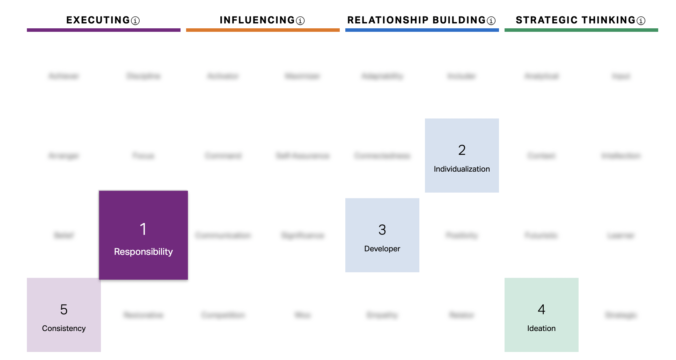CliftonStrengths is a 177-question assessment, resulting in 5 out of 34 themes (talents) that best describe your personality. It got popular because often the descriptions of the theme and the advice they give you after the assessment are extremely accurate and helpful.
Here are my top 5 CliftonStrengths themes.
- Responsibility – this post
- Individualization – read more
- Developer – read more
- Ideation – read more
- Consistency – read more
I recommend clicking and reading up on what these themes mean in CliftonStrengths world. Yes, they are more or less self-explanatory, but you shouldn’t be too hasty with drawing conclusions.
Example: if a person with Responsibility holds their newborn baby, do they feel the rush of responsibility? Well, typically no. Because they have lived with the decision and its consequences for 9 months already.
In this post and 4 following I’m going to show, by example, how each of these themes shows in my everyday work as a programmer.
I believe that knowing each other’s talents is worthwhile. It is a huge help in both understanding other people and communicating. Hopefully, this list gives you a glimpse of why I work as I do.
Responsibility as a programmer – 10 symptoms
1. Looking for ways to do it right
As the official description says, I think I might have:
near obsession for doing things right
This doesn’t mean perfectionism, although I might have signs of it.
This means that whatever I do, next time I want to do better. It’s OK to make mistakes. It’s bad to make the same mistake twice.
So, what is “the right way” to do programming?
2. Love of automated testing
First thing that came to mind when thinking about responsibility in programming.
In my eyes it’s obvious. The developer is responsible for the code. And nothing better provides responsibility than a suit of automated tests. For various reasons:
- Tests are really the only proof of how the code works
- Tests make a fantastic code-level documentation
- Tests provide a safety net when changing code in future
3. Collective ownership
Competence silos are ways of saying “it’s not my responsibility“. We should lead to reducing it.
4. Long cooperation
I like working for a long time on one project. It means living with the consequences of my own prior decisions. And it should be that way.
The opposite might be also true. I don’t like the mindset of “let’s just get paid and never come back to this project”.
5. Actually solve the problem
Finishing the task for me is more than just moving a ticket from one column to another. I want to make sure the problem is actually solved.
Discuss the best solution and alternatives, provide tests as proof, deploy, watch if anything broke, and hear the feedback if it really is what was requested.
Or if you will, I have a high bar for definition of done.
6. Don’t play with the client’s budget
I lean towards known and safe technologies. Not a fan of learning with your client’s money for your own pleasure and résumé.
Does it mean I am a techno-dinosaur? Hopefully not, because…
7. Timeboxing
That’s a nice technique to respect the client’s budget. I’m all for experiments, but they might get out of hand. The middle ground – timebox your experiments.
8. Looking for consequences in advance
I might be the guy who obsessively looks for potential problems, eg. when considering new technologies. That’s my way of saying “hey, we will have to live with the consequences“.
Guys, I am not clipping your wings. I only want the decision to be mature.
9. Next developer happiness
The business is not mine. For various reasons, eventually, I will be replaced. Why not make the next dev’s life easier?
For example, this exemplifies in leaving behind an abundance of information on how and why things work. A short and up-to-date README is a perfect example that comes to mind. Good programmers care about README.
For that matter, a good programmer is one easy to be replaced. Kinda sad but it is what it is.
As a nice side effect, I will be able to use the information left behind if I ever need it. In reality, this happens fairly often. The next developer will happen to be me, so it’s even more worthwhile.
10. It will get done if assigned to me
I heard that a few times here and there. I’m no one to judge but apparently yes.
Summary
I wasn’t surprised I got Responsibility as number 1. I kinda lived with it my whole life. Now CliftonStrengths really proficiently put it into words.
Look at one piece of official advice I got after the assessment:
Align yourself with others who share your sense of commitment. You will thrive when surrounded by others who take their responsibilities as seriously as you do.
For my clients and coworkers – I bet they like me to have this one so high. But personally, let me tell you – this theme can be a burden.

Leave a Reply